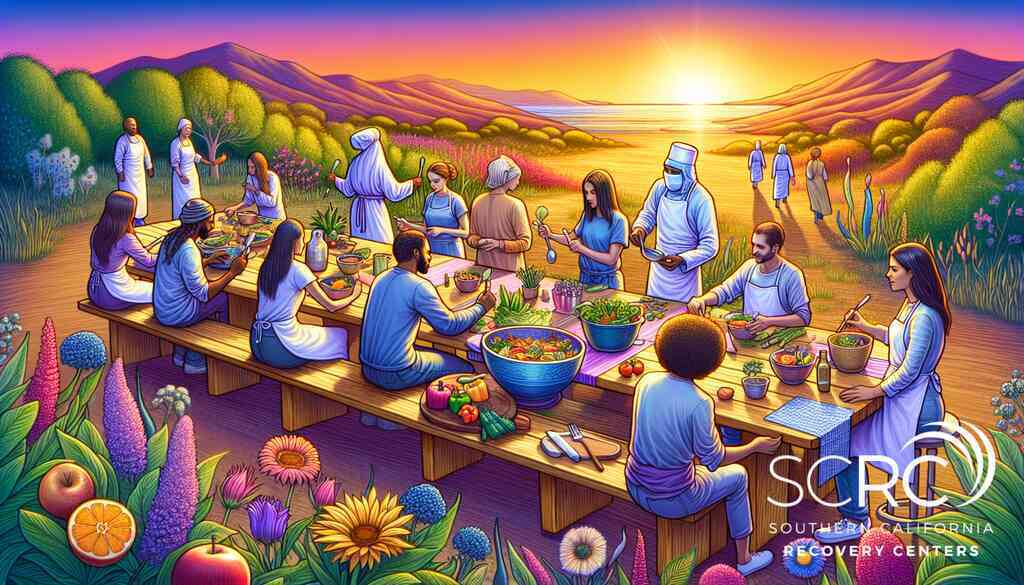Embarking on a Culinary Journey to Recovery
Understanding Addiction’s Hold: Beyond Substances to Culinary Cravings
Addiction is often perceived in the realm of substance abuse, yet the grip it holds can extend into culinary domains. Culinary cravings, while seemingly harmless, can manifest as a form of addiction, impacting both mental and physical health. Food addiction goes beyond mere indulgence; it involves the compulsive consumption of food, which shares similar neurological and psychological patterns with substance abuse disorders. At our culinary addiction recovery centers in Southern California, we acknowledge the severity of these cravings. Recognizing culinary addiction is a vital first step in addressing the broader landscape of addictive behaviors.
The Role of Food in Emotional and Physical Recovery
Food serves as more than just sustenance; it is heavily intertwined with emotional wellness and physical health. In the recovery process, nutrition plays a crucial role, helping to rebuild the body and mind. A balanced diet can aid in the stabilization of mood, improvement of sleep patterns, and enhancement of overall well-being. At Southern California’s recovery options for men, we emphasize the importance of crafting personalized nutritional plans that cater to the unique needs of each individual. Embracing food as a tool for healing fosters resilience and reinforces the journey to a healthier lifestyle.
Culinary Addiction in the Context of Southern California Recovery Centers
At Southern California Recovery Centers, we understand that culinary addiction requires a comprehensive approach. Our centers are well-versed in providing support that aligns with the unique cultural and culinary landscape of Southern California. Our multifaceted programs incorporate elements like Southern California’s holistic addiction care, aimed at integrating culinary therapy into a broader recovery strategy. By treating the individual as a whole, our programs extend beyond traditional methods and address the specific needs related to culinary addiction. Offering a structured pathway to recovery, we empower individuals to reclaim their lives with a renewed sense of purpose and well-being.
Holistic Approaches to Culinary Addiction Recovery
Integrating EMDR and Somatic Experiencing for Food Addiction
Eye Movement Desensitization and Reprocessing (EMDR) and Somatic Experiencing are transformative therapies. These therapies are designed not just for substance addiction but also for culinary recovery. EMDR helps unravel the emotional triggers linked to food addictions. By rewiring the brain’s response to these triggers, individuals can achieve a form of healing that is profound and lasting. Simultaneously, Somatic Experiencing addresses the physical sensations associated with stress and trauma. This dual approach creates a synergistic effect, facilitating an advanced emotional healing through EMDR therapy that nurtures recovery on both emotional and physical levels.
Crafting a New Palate: Vocational and Life Skills in Sobriety
Southern California Recovery Centers emphasize crafting a new palate not only through culinary therapy but also by instilling vocational and life skills. Sobriety is more than abstaining from substances or unhealthy food practices; it’s about finding purpose and direction. Incorporating vocational training, individuals are empowered to explore culinary vocations or other career paths, aligning personal interests with recovery goals. Life skills training complements this by ensuring individuals are prepared for daily challenges. With these tools, those on the path to recovery can create a balanced life where overcoming food addiction is a component of broader life success.
Trauma-Informed Culinary Recovery: A Pathway to Healing
A trauma-informed approach is essential in culinary addiction recovery. Many individuals with food addictions have underlying traumas that need attention. At Southern California Recovery Centers, trauma work is integral, offering therapies like EMDR, which have shown to be effective in processing past traumas. This creates a foundation for healing that acknowledges the intricate relationship between trauma and addiction. Clients are supported in exploring how trauma impacts culinary behaviors. This exploration fosters an environment where clients can develop healthier relationships with food and regain control over their culinary choices. Trauma-informed practices guide recovery, ensuring healing is comprehensive and deep-rooted.
Structured Daily Living: Building Accountability Through Culinary Practices
Structured daily living is pivotal in culinary recovery, as it builds accountability and reinforces sobriety. By integrating culinary practices and structured daily living in recovery, individuals learn the importance of routine and responsibility. Southern California’s recovery centers encourage clients to partake in meal planning and preparation. This not only offers practical skills but instills discipline. Engaging in structured activities enhances accountability, ensuring clients make mindful eating choices. This structured approach is complemented by continuous support from our expert staff, ensuring every individual feels equipped and confident in their recovery journey. By fostering accountability, culinary recovery becomes both a sustainable and empowering experience.
Personalized and Community-Oriented Recovery Paths
Personalized Addiction Treatment: Tailoring Recovery to Culinary Challenges
At Southern California Recovery Centers, crafting personalized addiction treatment plans is a core principle of our approach. Culinary addiction presents unique challenges, demanding tailored strategies to address individual needs. Each person’s relationship with food is distinct and influenced by personal history, emotional triggers, and physical health. Our programs offer individualized plans that assess and incorporate these factors, creating a pathway designed specifically for culinary addiction recovery. By focusing on personal elements, we ensure that treatment is not only comprehensive but also meaningful and effective. This meticulous personalization empowers individuals to confront their culinary cravings with confidence and skill, ultimately paving the way for lasting recovery.
The Role of Male-Only and Veteran Support Groups in Culinary Recovery
In the culinary recovery landscape, male-only and veteran support groups hold significant value. Southern California Recovery Centers recognize the power of community support in overcoming food addiction. Male-only programs provide a safe space for men to share experiences and challenges unique to their recovery journey. Such groups foster an environment of understanding and camaraderie, which is crucial for healing. Similarly, supportive resources for veterans offer tailored approaches to accommodate the specific needs of veterans, addressing culinary addictions within a familiar framework of discipline and service. These support structures play an integral role as clients draw strength and resilience from shared experiences, enhancing their recovery process.
CEOs to Young Adults: Diverse Support Systems in Culinary Healing
Our recovery programs cater to a diverse clientele, from CEOs to young adults, each benefiting from customized support systems. Executives often face unique stressors, and our CEO-focused addiction recovery strategies are designed to address these pressures while promoting culinary healing. For young adults, the journey towards recovery is different but equally crucial. We provide engagement and learning opportunities tailored to their life stage, ensuring relevance and impact. These diverse support systems reflect our commitment to individualized care, reaching out to people across various walks of life. This inclusivity not only enriches the recovery experience but also illustrates Southern California Recovery Centers’ dedication to fostering a supportive and holistic recovery environment.
Continuity of Care and Holistic Lifestyle Changes in Culinary Addiction
Continuity of care, combined with holistic lifestyle changes, is essential in culinary addiction recovery. Southern California Recovery Centers emphasize seamless transitions from active treatment to post-recovery life, ensuring consistent support and guidance. Our approach integrates holistic lifestyle changes, encouraging clients to embrace nutrition, exercise, and mental well-being as core aspects of their recovery plan. By embedding these elements into daily routines, individuals are better equipped to maintain sobriety and navigate life’s challenges. This continuity cultivates stability and resilience, transforming the temporary strides made in treatment into lifelong habits. Our comprehensive support network ensures each client receives the resources necessary for thriving beyond the recovery period, epitomizing the best strategies for recovery at Southern California Recovery Centers.
Conclusion: Nurturing Resilience Through Culinary Transformation
Empowering Sustainable Recovery through Culinary Independence
Culinary independence is not merely about managing cravings but about instilling a sense of empowerment in recovery. By embracing culinary therapy, individuals learn to navigate their relationship with food, leading to sustainable recovery. At Southern California Recovery Centers, clients are encouraged to take active roles in meal preparation, understanding nutrition, and recognizing how food impacts their overall health. This proactive approach cultivates resilience, allowing individuals to reclaim their lives from culinary addiction. The journey to culinary independence is supported by continuous education and professional guidance, ensuring that recovery is not just attainable but vibrant and enduring.
Fostering a Supportive Community in Southern California’s Culinary Recovery Programs
Community support is a cornerstone of successful recovery, especially in culinary addiction. Southern California Recovery Centers recognize the importance of a supportive network in facilitating healing. Our programs offer a platform for individuals to connect, share experiences, and grow together. The community atmosphere fosters an environment where empathy and understanding flourish, essential components in overcoming culinary challenges. Support groups, workshops, and communal activities are integrated into the recovery process, enhancing each individual’s experience. By nurturing a sense of belonging, Southern California Recovery Centers empower clients to thrive within a positive and encouraging community.
A New Day in Dana Point and Carlsbad for Culinary Healing Aspirants
Dana Point and Carlsbad offer picturesque settings for individuals embarking on their culinary healing journeys. Southern California Recovery Centers provide a refuge in these vibrant locales, combining the natural beauty of the surroundings with cutting-edge treatment approaches. The programs here are designed to offer culturally and geographically relevant support, ensuring that each client receives care that resonates with their environment. Our Dana Point recovery facilities and Carlsbad locations are equipped to address the unique needs of culinary addiction, offering personalized pathways to recovery. As new days dawn in these serene landscapes, individuals find hope and healing, embarking on a transformative journey toward lifelong wellness.
Frequently Asked Questions
Question: What types of therapies are included in the culinary addiction recovery programs at Southern California Recovery Centers?
Answer: At Southern California Recovery Centers, we incorporate transformative therapies such as EMDR therapy for addiction and somatic experiencing in recovery, which are integral to our holistic healing approach toward culinary addiction. These therapies help individuals address emotional and physical triggers associated with food addiction, allowing for profound and lasting recovery changes.
Question: How do the Guidelines for Culinary Addiction Recovery at Southern California utilize structured daily living to aid recovery?
Answer: Structured daily living is a pivotal element of our culinary addiction recovery strategy as it builds accountability. Southern California Recovery Centers integrate culinary practices into routine activities, helping individuals develop discipline and mindfulness toward their eating habits. This structured approach, coupled with continuous support, ensures a sustainable and empowering recovery journey. Learn more about Achieving Sobriety at Southern California Recovery Centers.
Question: Can you explain how personalized addiction treatment is applied to culinary addiction challenges at Southern California Recovery Centers?
Answer: Recognizing that each individual’s relationship with food is unique, Southern California Recovery Centers crafts personalized addiction treatment plans. By assessing personal history, emotional triggers, and physical health, we tailor programs to address culinary addiction specifically. This meticulous personalization ensures comprehensive and effective treatment, empowering individuals to confront their culinary cravings confidently.
Question: What role do community support and group sessions play in the culinary addiction recovery programs?
Answer: Community support is a cornerstone of our culinary addiction recovery programs. Southern California Recovery Centers offer various group sessions, including male-only and veteran support groups, fostering environments of empathy and understanding. These support structures enhance recovery by allowing clients to share experiences and draw strength from shared challenges, promoting a collective healing journey.
Question: How do Southern California Recovery Centers equip individuals with skills for life after recovery?
Answer: Beyond achieving sobriety, our centers emphasize equipping clients with life and vocational skills essential for a balanced lifestyle post-recovery. Through vocational training, clients explore culinary vocations or other career paths aligned with their goals. Refer to the Guide to Innovative CEO Recovery Tactics at SCRC. Life skills training ensures they’re prepared for daily challenges, fostering independence and confidence in their respective journeys.





